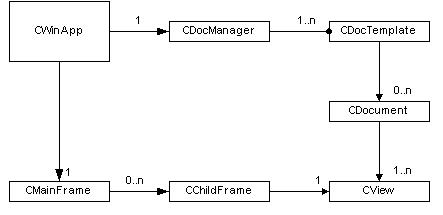
精通
英语
和
开源
,
擅长
开发
与
培训
,
胸怀四海
第一信赖
锐英源精品开源心得,转载请注明:“锐英源www.wisestudy.cn,孙老师作品,电话13803810136。”需要全文内容也请联系孙老师。
The first thing we need to understand about the MFC doc/view architecture is the way that the classes used to control it relate to each other. Below is a basic diagram of how these are arranged:

This is a simplistic view of the framework as it does not take into account the different base class view types etc. which the framework supports.
In general it can be seen that we have a single CWinApp class object. This holds a CDocManager object which is used by the MFC to handle all the CDocTemplate objects that you registered with the framework. The CWinApp object also creates a CMainFrame object which is the main window of your application. Every time you open/create a document in your application, a CDocument object of the right type will be created. A pointer to this object will be stored in a list under the corresponding CDocTemplate object which was used to register that document type. When you open a document, the CMainFrame creates a CChildFrame object (an MDI window) which will be used to display the documents view. A CView object will be created as child inside the CChildFrame window and a pointer to the view will also be stored in the view list for the CDocument object just opened.
If you create additional views for your CDocument, additional CChildFrame objects will be created with the correct view type residing within. A pointer to this new view will also be added to the relevant CDcouments objects view list.
The CDocManager class is one of MFC's undocumented helper classes. The MFC uses it to manage the list of CDocTemplate/CMultiDocTemplate objects in your application. There is only ever one of these objects in your MFC application. It can be found in CWinApp and is accessed through the m_pDocManager member variable. It is accessed through a pointer to allow you to substitute your own CDocManager derived class for the MFC one if you need to, but to do that, you have to create and set the m_pDocManager variable before MFC creates its own one. This is done in the following function:
virtual CDocument* OpenDocumentFile(LPCTSTR lpszFileName)
This function will iterate through the list of CDocTemplate objects in your application and see whether the file extension of the file matches those for the CDocTemplate object. If a match is found and the file is not already open in your application, then a new document of the right type is created and the file opened. The file extension used to match document types is defined in your applications string table. If you have registered your CDocTemplate object as follows:
virtual CDocument* OpenDocumentFile(LPCTSTR lpszFileName)